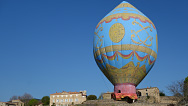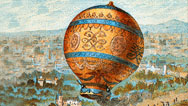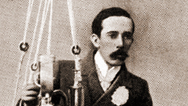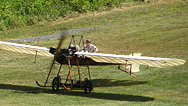Balloon Animals
- By Ari Daniel
- Posted 10.23.14
- NOVA
The first hot air balloon flights had their ups and downs. Evan Hadingham, NOVA's Senior Science Editor, describes the adventures of the Montgolfier brothers. They invented the hot air balloon and convinced the world that human flight was possible. Their early escapades involved smoke, royal scrutiny, and farm animals.
Transcript
Balloon Animals
Posted: October 23, 2014
Evan Hadingham: It’s one of humanity’s oldest dreams: to leave the surface of the Earth far behind and to soar into the clouds like a bird. It took many centuries to realize that dream, of course, and there were many milestones along the way—the Wright brothers’ flight, the Apollo 11 landing on the moon. But the date I’m thinking of was a couple of centuries ago—November the 21st, 1783. That was the date of the world’s first voyage in a hot air balloon that carried human beings aloft.
The hot air balloon was invented by two French brothers, Joseph and Etienne Montgolfier, who ran a highly successful paper-making business. And the story goes that Joseph got the idea one evening when he was watching his wife’s laundry— specifically, his wife’s blouse billowing in the hot air rising from the fireplace.
The Montgolfiers’ first experiments involved little paper bags with candles suspended underneath that they launched from their porch at night. They experimented with bigger and bigger balloons, until finally they made one out of paper and canvas that was seven stories high and fully capable of lifting a human being.
There was just one complication. By this time, their flights had created such a sensation in France that their base of operations had been moved to the palace of Versailles under the watchful eye of Louis XVI himself, who was reluctant to have human beings risk their lives. So the king decreed there had to be a guinea pig, or rather a rooster, a sheep, and a duck all crammed into a wicker cage slung underneath the balloon. It seems that even back then passenger legroom was an issue.
Now the curious thing about the Montgolfiers is that although they built increasingly successful hot air balloons, they had no real idea at all of why their balloons worked. Now, a hot air balloon rises because hot air is less dense than the surrounding air and so it carries the balloon upwards.
But the Montgolfiers didn’t realize that. They thought that the smoke from the fire burning underneath the balloon was a special lifting gas…and that the smokier the fire, the more powerfully the balloon would rise into the sky. So it’s said they they shoveled all kinds of things into the fire to make more smoke, such as wool, old shoes, even decomposing meat. As the balloon got ready to lift off, the stench was so overpowering that it’s said that King Louis and Marie Antoinette fled the scene in disgust.
But the story has a happy ending. The plucky animals, after an eight-minute two-mile flight, landed safely and scampered out of their cage, unscathed. The first human balloon flights would soon follow.
For more about those pioneering flights, fed by a power source even smellier than rocket fuel, be sure to tune into NOVA’s “Ben Franklin’s Balloons.”
So Kieran, did you ever hear the one about the sheep, the rooster, and the duck?
Kieran McWilliam: No, Evan. But go clean up your mess!
Credits
PRODUCTION CREDITS
- Produced by
- Ari Daniel
Elizabeth Gillis - Production Assistance
- Kristen Clark
Bridget Reed Morawski - Original Footage
- © WGBH Educational Foundation 2014
MEDIA CREDITS
- Starring
- Evan Hadingham
Kieran McWilliam - Wright Brothers' plane
- NASA (Public Domain)
- Moon footprint
- NASA (Public Domain)
- Versailles
- Wikimedia Commons (Public Domain)
- Louis XVI
- Wikimedia Commons/Callet (Public Domain)
- Additional video footage
- NOVA's Ben Franklin's Balloons
- Music
- Free Music Archive/Soni Ventorum Wind Quartet (CC BY-SA 3.0)
Hornpipe by Paul Mottram - Special Thanks
- Irish Village in Brighton, MA
IMAGE
- (main image: Evan and Kieran at bar)
- © WGBH Educational Foundation 2014
Related Links
-

Ben Franklin's Balloons
Experts recreate the French's daring first manned flights, which Franklin had chronicled.
-

A Short History of Ballooning
Follow a chronology of manned flight, from the very first flight in 1783 to the first solo Pacific crossing in 1995.
-

My First Balloon Ascent
The pioneering aviator Alberto Santos-Dumont recalls his initial exhilarating experience among the clouds.
-

Antique Aviation
Hear three pilots describe what it's like to fly pioneer aircraft.

